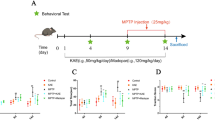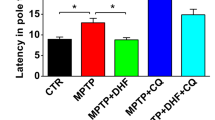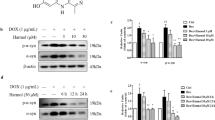Abstract
1-Methyl-4-phenyl-1,2,3,6-tetrahydropyridine (MPTP) exacerbates mitochondrial impairment and α-synuclein expression leading to Parkinsonism. Impaired mitochondria and over-expressed α-synuclein are degraded and eliminated via macroautophagy and chaperone-mediated autophagy. Owing to multiple properties, silymarin protects from oxidative stress–mediated cellular injury. However, its effect on MPTP-induced changes in autophagy is not yet known. The study aimed to decipher the effect of silymarin on MPTP-induced changes in autophagy. Male mice (20–25 g) were treated with silymarin (intraperitoneally, daily, 40 mg/kg) for 2 weeks. On day 7, a few animals were also administered with MPTP (intraperitoneally, 20 mg/kg, 4 injections at 2-h interval) along with vehicles. Striatal dopamine content was determined. Western blot analysis was done to assess α-synuclein, beclin-1, sequestosome, phosphorylated 5′ adenosine monophosphate–activated protein kinase (p-AMPK), lysosome-associated membrane protein-2 (LAMP-2), heat shock cognate-70 (Hsc-70), LAMP-2A, phosphorylated unc-51-like autophagy activating kinase (p-Ulk1), and phosphorylated mechanistic target of rapamycin (p-mTOR) levels in the nigrostriatal tissue. Silymarin rescued from MPTP-induced increase in beclin-1, sequestosome, p-AMPK, and p-Ulk1 and decrease in LAMP-2, p-mTOR, and LAMP-2A levels. Silymarin defended against MPTP-induced increase in α-synuclein and reduction in dopamine content. The results demonstrate that silymarin protects against MPTP-induced changes in autophagy leading to Parkinsonism.




Similar content being viewed by others
References
Ali SF, David SN, Newport GD, Cadet JL, Slikker W Jr (1994) MPTP-induced oxidative stress and neurotoxicity are age-dependent: evidence from measures of reactive oxygen species and striatal dopamine levels. Synapse 18:27–34. https://doi.org/10.1002/syn.890180105
Bové J, Martínez-Vicente M, Dehay B, Perier C, Recasens A, Bombrun A, Antonsson B, Vila M (2014) BAX channel activity mediates lysosomal disruption linked to Parkinson disease. Autophagy 10(5):889–900. https://doi.org/10.4161/auto.28286
Cuervo AM, Stefanis L, Fredenburg R, Lansbury PT, Sulzer D (2004) Impaired degradation of mutant alpha synuclein by chaperone-mediated autophagy. Science 305(5688):1292–1295. https://doi.org/10.1126/science.1101738
Cui M, Aras R, Christian WV, Rappold PM, Hatwar M, Panza J, Jackson-Lewis V, Javitch JA, Ballatori N, Przedborski S (2009) The organic cation transporter-3 is a pivotal modulator of neurodegeneration in the nigrostriatal dopaminergic pathway. Proc Natl Acad Sci 106:8043–8048. https://doi.org/10.1073/pnas.0900358106
Dauer W, Przedborski S (2003) Parkinson’s disease: mechanism and models. Neuron 39:889–909. https://doi.org/10.1016/S0896-6273(03)00568-3
Gazak R, Walterova D, Kren V (2007) Silybin and silymarin- new and emerging applications in medicine. Curr Med 14:315–338. https://doi.org/10.2174/092986707779941159
Gibb WR, Lees AJ (1988) The relevance of the Lewy body to the pathogenesis of idiopathic Parkinson’s disease. J Neurol Neurosurg Psychiatry 51(6):745-752. http://doi.org/https://doi.org/10.1136/jnnp.51.6.745
Guo Z, Xu S, Du N, Liu J, Huang Y, Han M (2016) Neuroprotective effects of stemazole in the MPTP-induced acute model of Parkinson’s disease: involvement of the dopamine system. Neurosci Lett 616:152–159. https://doi.org/10.1016/j.neulet.2016.01.048
Gupta SP, Yadav S, Singhal NK, Tiwari MN, Mishra SK, Singh MP (2014) Does restraining nitric oxide biosynthesis rescue from toxins-induced Parkinsonism and sporadic Parkinson’s disease? Mol Neurobiol 49(1):262–275. https://doi.org/10.1007/s12035-013-8517-4
Haddadi R, Nayebi AM, Farajniya S, Brooshghalan SE, Sharifi H (2014) Silymarin improved 6-OHDA-induced motor impairment in hemi-Parkisonian rats: behavioral and molecular study. Daru 22:38. https://doi.org/10.1186/2008-2231-22-38
Haddadi R, Nayebi AM, Eyvari Brooshghalan S (2018) Silymarin prevents apoptosis through inhibiting the Bax/caspase-3 expression and suppresses toll like receptor-4 pathway in the SNc of 6-OHDA intoxicated rats. Biomed Pharmacother 104:127–136. https://doi.org/10.1016/j.biopha.2018.05.020
Herraiz T, Guillén H (2011) Inhibition of the bioactivation of the neurotoxin MPTP by antioxidants, redox agents and monoamine oxidase inhibitors. Food Chem Toxicol 49:1773–1781. https://doi.org/10.1016/j.fct.2011.04.026
Iwata A, Riley BE, Johnston JA, Kopito RR (2005) HDAC6 and microtubules are required for autophagic degradation of aggregated huntingtin. J Biol Chem 280(48):40282–40292. https://doi.org/10.1074/jbc.M508786200
Jackson-Lewis V, Przedborski S (2007) Protocol for the MPTP mouse model of Parkinson’s disease. Nat Protoc 2(1):141–151. https://doi.org/10.1038/nprot.2006.342
Kaushik S, Cuervo AM (2008) Chaperone-mediated autophagy. Methods Mol Biol 445:227–244. https://doi.org/10.1007/978-1-59745-157-4_15
Kuroiwa H, Yokoyama H, Kimoto H, Kato H, Araki T (2010) Biochemical alterations of the striatum in an MPTP-treated mouse model of Parkinson’s disease. Metab Brain Dis 2:177–183. https://doi.org/10.1007/s11011-010-9195-9
Langston JW (2017) The MPTP story. J Park Dis 7(s1):S11–S19. https://doi.org/10.3233/JPD-179006
Lee Y, Park HR, Chun HJ, Lee J (2015) Silibinin prevents dopaminergic neuronal loss in a mouse model of Parkinson’s disease via mitochondrial stabilization. J Neurosci Res 93(5):755–765. https://doi.org/10.1002/jnr.23544
Lee SB, Kim HT, Yang HO, Jang W (2018) Anodal transcranial direct current stimulation prevents methyl-4-phenyl-1,2,3,6-tetrahydropyridine (MPTP)-induced neurotoxicity by modulating autophagy in an in vivo mouse model of Parkinson’s disease. Sci Rep 8(1):15165–15169. https://doi.org/10.1038/s41598-018-33515-7
Levine B, Kroemer G (2008) Autophagy in the pathogenesis of disease. Cell 132(1):27–42. https://doi.org/10.1016/j.cell.2007.12.018
Majeski AE, Dice JF (2004) Mechanisms of chaperone-mediated autophagy. Int J Biochem Cell Biol 36(12):2435–2444. https://doi.org/10.1016/j.biocel.2004.02.013
Mak SK, McCormack AL, Manning-Bog AB, Cuervo AM, Di Monte DA (2010) Lysosomal degradation of alpha-synuclein in vivo. J Biol Chem 285(18):13621–13629. https://doi.org/10.1074/jbc.M109.074617
Mishra AK, ur Rasheed MS, Shukla S, Tripathi MK, Dixit A, Singh MP (2015) Aberrant autophagy and Parkinsonism: does correction rescue from disease progression? Mol Neurobiol 51(3):893–908. https://doi.org/10.1007/s12035-014-8744-3
Mishra AK, Mishra S, Rajput C, Ur Rasheed MS, Patel DK, Singh MP (2018) Cypermethrin activates autophagosome formation albeit inhibits autophagy owing to poor lysosome quality: relevance to Parkinson’s disease. Neurotox Res 33(2):377–387. https://doi.org/10.1007/s12640-017-9800-3
Olanow CW (2007) The pathogenesis of cell death in Parkinson’s disease. Mov Disord 22 Suppl 17:S335–S342. https://doi.org/10.1002/mds.21675
Pan T, Kondo S, Le W, Jankovic J (2008) The role of autophagy-lysosome pathway in neurodegeneration associated with Parkinson’s disease. Brain 131(8):1969–1978. https://doi.org/10.1093/brain/awm318
Pérez-H J, Carrillo-S C, García E, Ruiz-Mar G, Pérez-Tamayo R, Chavarría A (2014) Neuroprotective effect of silymarin in a MPTP mouse model of Parkinson’s disease. Toxicology 319:38–43. https://doi.org/10.1016/j.tox.2014.02.009
Przedborski S, Jackson-Lewis V, Naini AB, Jakowec M, Petzinger G, Miller R, Akram M (2001) The Parkinsonian toxin 1-methyl-4-phenyl-1,2,3,6-tetrahydropyridine (MPTP): a technical review of its utility and safety. J Neurochem 76(5):1265–1274. https://doi.org/10.1046/j.1471-4159.2001.00183.x
Rasheed MSU, Tripathi S, Mishra S, Singh MP (2017) Coherent and contradictory facts, feats and fictions associated with metal accumulation in Parkinson’s disease: epicenter or outcome, yet a demigod question. Mol Neurobiol 54(6):4738–4755. https://doi.org/10.1007/s12035-016-0016-y
Schapira AH (2009) Etiology and pathogenesis of Parkinson disease. Mov Disord 26(6):1049–1055. https://doi.org/10.1002/mds.23732
Singh MP, Patel S, Dikshit M, Gupta YK (2006) Contribution of genomics and proteomics in understanding the role of modifying factors in Parkinson’s disease. Indian J Biochem Biophys 43(2):69–81 http://www.nopr.niscair.res.in/bitstream/123456789/3264/1/IJBB%2043(2)%2069-81.pdf
Singh AK, Tiwari MN, Upadhyay G, Patel DK, Singh D, Prakash O, Singh MP (2010) Long term exposure to cypermethrin induces nigrostriatal dopaminergic neurodegeneration in adult rats: postnatal exposure enhances the susceptibility during adulthood. Neurobiol Aging 33(2):404–415. https://doi.org/10.1016/j.neurobiolaging.2010.02.01
Singhal NK, Srivastava G, Patel DK, Jain SK, Singh MP (2011) Melatonin or silymarin reduces maneb- and paraquat-induced Parkinson’s disease phenotype in the mouse. J Pineal Res 50(2):97–109. https://doi.org/10.1111/j.1600-079X.2010.00819.x
Singhal NK, Chauhan AK, Jain SK, Shanker R, Singh C, Singh MP (2013) Silymarin- and melatonin-mediated changes in the expression of selected genes in pesticides-induced Parkinsonism. Mol Cell Biochem 384(1-2):47–58. https://doi.org/10.1007/s11010-013-1780-x
Srivastava G, Singh K, Tiwari MN, Singh MP (2010) Proteomics in Parkinson’s disease: current trends, translational snags and future possibilities. Expert Rev Proteomics 7(1):127–139. https://doi.org/10.1586/epr.09.91
Srivastava G, Dixit A, Yadav S, Patel DK, Prakash O, Singh MP (2012) Resveratrol potentiates cytochrome P450 2d22-mediated neuroprotection in maneb- and paraquat-induced Parkinsonism in the mouse. Free Radic Biol Med 52(8):1294–1306. https://doi.org/10.1016/j.freeradbiomed.2012.02.005
Tripathi MK, Rajput C, Mishra S, Ur Rasheed MS, Singh MP (2019) Malfunctioning of chaperone-mediated autophagy in Parkinson’s disease: feats, constraints and flaws of modulators. Neurotox Res 35(1):260–270. https://doi.org/10.1007/s12640-018-9917-z
Wong AS, Lee RH, Cheung AY, Yeung PK, Chung SK, Cheung ZH, Ip NY (2011) Cdk5-mediated phosphorylation of endophilin B1 is required for induced autophagy in models of Parkinson’s disease. Nat Cell Biol 13(5):568–579. https://doi.org/10.1038/ncb2217
Xilouri M, Vogiatzi T, Vekrellis K, Park D, Stefanis L (2009) Abberant alpha-synuclein confers toxicity to neurons in part through inhibition of chaperone-mediated autophagy. PLoS One 4(5):e5515. https://doi.org/10.1371/journal.pone.0005515
Yadav S, Dixit A, Agrawal S, Singh A, Srivastava G, Singh AK, Srivastava PK, Prakash O, Singh MP (2012) Rodent models and contemporary molecular techniques: notable feats yet incomplete explanations of Parkinson’s disease pathogenesis. Mol Neurobiol 46(2):495–512. https://doi.org/10.1007/s12035-012-8291-8
Zhu JH, Horbinski C, Guo F, Watkins S, Uchiyama Y, Chu CT (2007) Regulation of autophagy by extracellular signal-regulated protein kinases during 1-methyl-4-phenylpyridinium-induced cell death. Am J Pathol 170(1):75–86. https://doi.org/10.2353/ajpath.2007.060524
Acknowledgments
We sincerely express our gratitude to the Department of Biotechnology, India, for rendering fellowship to the first author; Department of Science and Technology, India, to the second author; and Council of Scientific and Industrial Research, India, to the third author of the article. The CSIR-IITR communication number of this article is 3600.
Conflict of Interest
The authors declare that they have no conflicts of interest.
Author information
Authors and Affiliations
Contributions
Manish Kumar Tripathi was involved in the data generation, acquisition, and analysis. Mohd Sami Ur Rasheed and Abhishek Kumar Mishra were involved in performing some initial experiments and treating the experimental animals if and when Manish Kumar Tripathi was on leave or busy in some other activities. Devendra Kumar Patel performed dopamine estimation. Mahendra Pratap Singh conceived the study plan and interpreted the analyzed data, which were provided by the first author. Manish Kumar Tripathi wrote the first version of the manuscript and Mahendra Pratap Singh revised the language. All authors have gone through the submitted version of the manuscript and endorsed the same.
Corresponding author
Ethics declarations
The present investigation was endorsed by the animal ethics committee of the institute.
Additional information
Publisher’s Note
Springer Nature remains neutral with regard to jurisdictional claims in published maps and institutional affiliations.
Rights and permissions
About this article
Cite this article
Tripathi, M.K., Rasheed, M.S.U., Mishra, A.K. et al. Silymarin Protects Against Impaired Autophagy Associated with 1-Methyl-4-phenyl-1,2,3,6-tetrahydropyridine-Induced Parkinsonism. J Mol Neurosci 70, 276–283 (2020). https://doi.org/10.1007/s12031-019-01431-8
Received:
Accepted:
Published:
Issue Date:
DOI: https://doi.org/10.1007/s12031-019-01431-8




